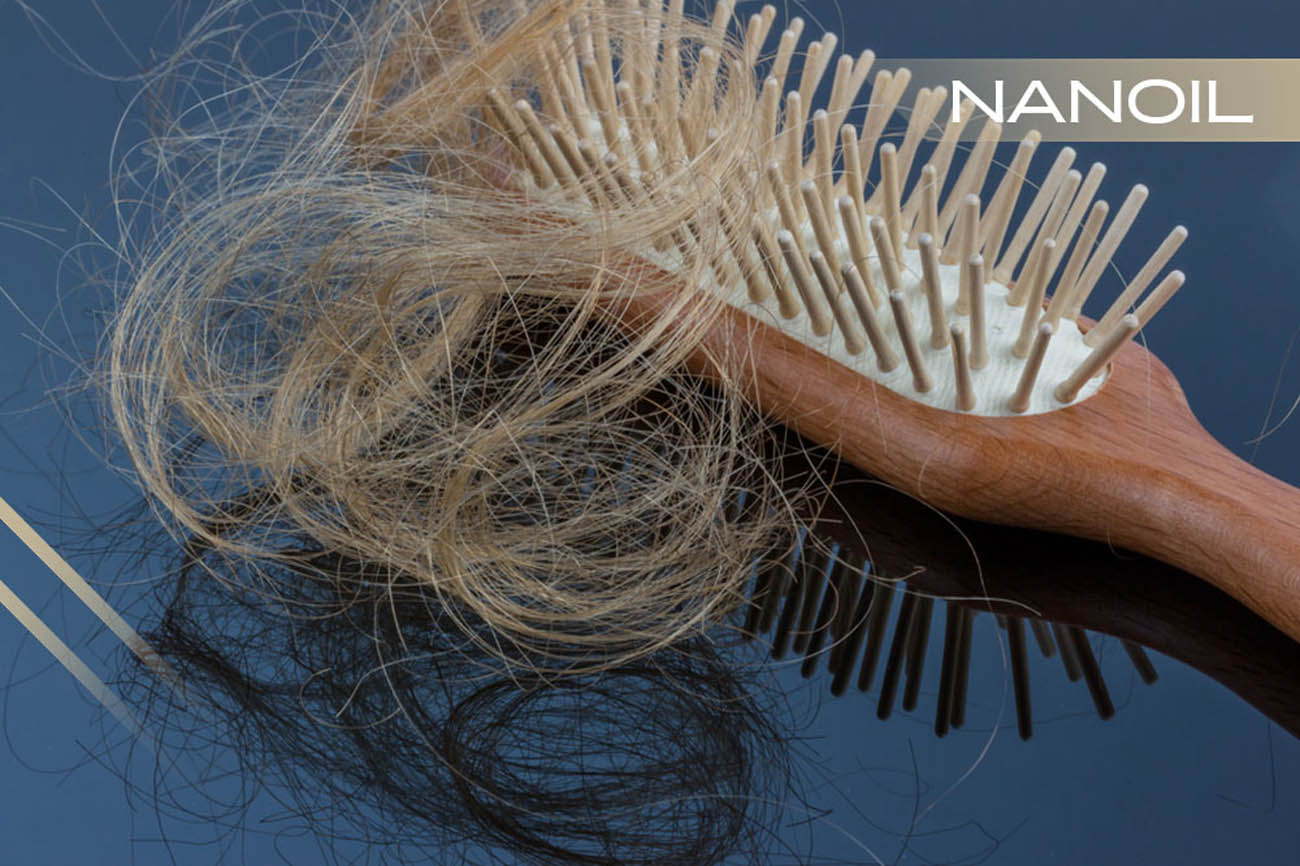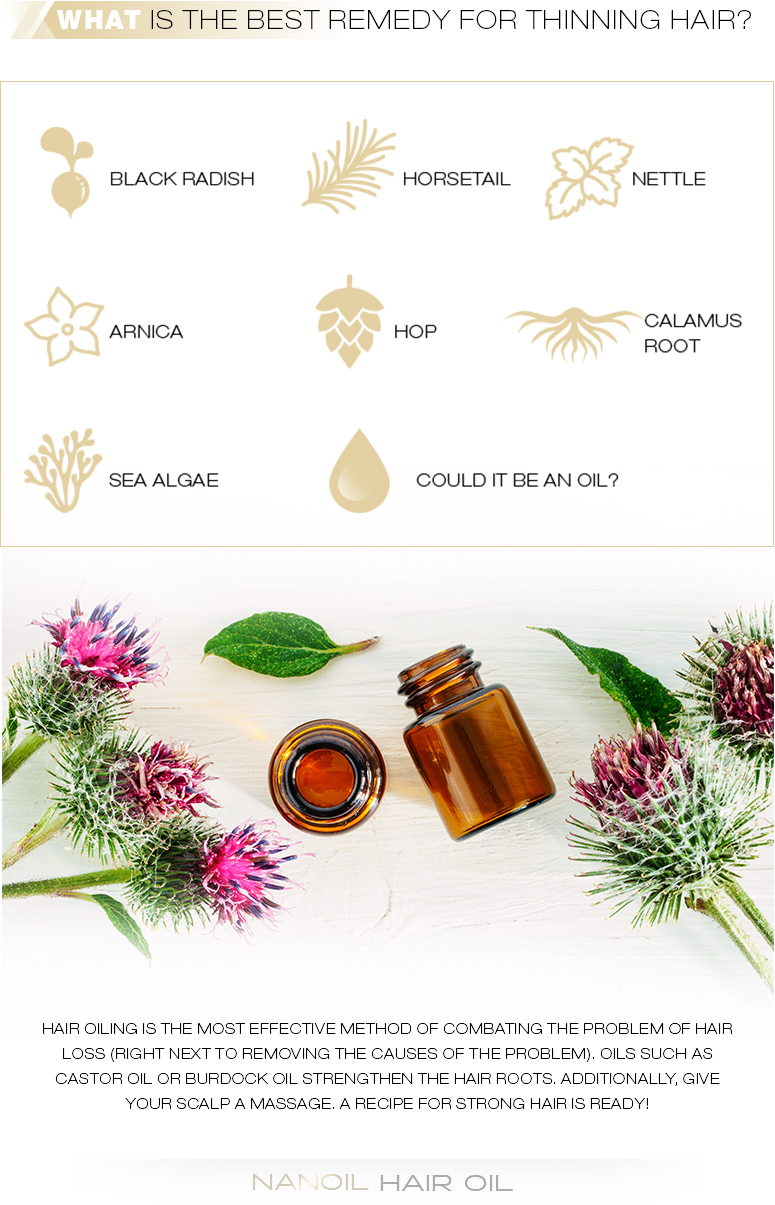- NANOIL Products
- Oils
- Face serums
- Hair masks
- Shampoos
- Hair conditioners
- Hair styling
- Care
- Hair Porosity Test
- Blog
- Contact

It is a completely natural process when hair falls out. It affects each and every one of you. Losing more than one hundred hairs a day means a problem. Forget the counting, though. Just observe your hair. Since there are so many causes of the problem, how to care for thinning hair?
Taking a closer look at your hair makes sense if you want to find out when falling out hair should be worrying. Discovering the causes of this problem is the easiest way to define which products to use for treating hair loss. Every situation is different so it’s important to gather detailed info on this subject.
Similarly to dandruff, hair thinning is an embarrassing ailment. Without the right care, the problem is intensified. We lose more and more hair. The truth is that hair fall is natural. 100 hairs a day is a standard but you don’t need to count them to know when the situation gets dangerous. Mostly, it’s an aesthetic problem so you can notice more hairs on your brush or in the shower.
You should remember that thinning hair may signalize different health problems and you can’t play it down. Even if a bit less hair isn’t bothersome, knowing the causes is a good thing which may inform you about something bad going on in your body.
Defining when to be alarmed by falling-out hair is as important as finding the cause of [hair loss]. Every case is different. The answer to the question why hair falls out may give you valuable tips to solve the problem. The conscious hair care is the best you can do when your strands start falling out in excess.
1. Chemical factors – hair falls out excessively because its structure weakens due to products for bleaching and coloring. Hair loss often affects women who have their hair colored dark but it may also mean your body doesn’t tolerate some medication or… beauty products.
2. Mechanical factors – the way you treat your hair and things you do that weaken the hair bulbs and follicles e.g. tight updos and braids, hair extensions, clips, hair elastics, wrong brushing routine.
3. Physical factors – very high or low temperature is another cause of thinning hair. Other things that encourage your hair to fall out include frost, heat waves, heat styling, medical radiation and even a fever when you’re sick.
4. Bacteria and fungi – too many strands on your brush may result from the disturbed acid-base balance of the scalp, leading to the development of harmful bacteria, fungi and micro-organisms. Generally, all scalp conditions (dandruff, folliculitis) cause hair loss.
5. Genetic predisposition - you must come to terms with the fact that hair loss is hereditary and you can inherit this ailment from your parents or grandparents.
6. Hormonal imbalance – hormones also hugely affect your hairdo e.g. the level of estrogen which increases in pregnant women. Hair loss after and during pregnancy is connected with changes in the hair life cycle due to hormone action.
7. Other causes – stress is another thing among many hair loss causes. Being constantly exposed to stressful situations may hinder the hair growth, damage the hair bulbs or trigger inflammation. Other causes include alcohol overuse, cigarettes, diseases (including scalp diseases) or poor diet.
Should you panic when hair falls out excessively? There’s no point in worrying when your hair seems to be everywhere – such observations aren’t reliable. If your hair’s long, you get an impression you lose more strands. It’s similar in case of curls – you don’t brush them that much or don’t wash every day so with every washing or brushing routine it seems like there are more strands falling out. Remember, a hair that has fallen out doesn't hit the floor the moment it leaves its bulb. Before that, it remains interwoven with hair that still grows. The problem is serious when far more than one hundred hairs fall out daily or when it comes together with dandruff, nail breakage or skin dryness.
Lots of people have doubts and aren’t sure if hair regrowth is possible. Will the right hair care bring back its previous state? Sadly, you can’t save the hair that has already fallen out or has very weak bulbs. On the other hand, a delivery of proper nutrients may prevent further hair loss and stimulate the growth of stronger, thicker and damage-resistant hair. You can enjoy healthy and voluminous hairdo again.
It’s time to answer the question what to use for hair loss. Without knowing the ways to enhance thinning hair, you won’t choose appropriate haircare products and define the best routine. There are different ways to keep hair from falling out and you should give them a try.
Eliminating the cause of hair loss (if it’s possible) should be your priority. Obviously, you can’t give up on antibiotics when you’re sick. Still, it’s possible to avoid the things that do harm. Then, you can start thinking of ways to care for thinning hair.
What helps for hair loss? At first:
In every hair care routine, choose SLS-free shampoos because they neither irritate nor make the scalp dry. A mild shampoo – without strong detergents, preservatives and alcohols – is the best your weak hair can get. A good shampoo for thinning hair should contain the following ingredients: horsetail, nettle, extracts from arnica, hop or anti-hair loss calamus root.
Not to fall out, hair needs the right level of moisture which may be reduced because of high temps. You should wash hair with lukewarm water and let it air dry. The number of hair falling out may get bigger because of the way you dry your hair immediately after washing – towel-drying and wearing tight turbans aren’t recommended. These few changes may help you reduce hair loss.
Using professional anti-hair loss products is the easiest way. You don’t have to pick some medication yet supplements may improve the situation. Conditioners, masks, balms and scalp treatments make the best solution – the choice is up to you. The chosen product must include natural nutrients and substances that moisturise and strengthen hair from the bulbs to the ends. What’s a good anti-hair loss treatment?

Wondering how to enhance thinning hair makes us think of professional treatments and pricey scalp ampules. Believe it or not, you can solve the problem out with home methods, using:
Anti-hair loss scalp lotions are the key element. Such treatments have a great benefit because they reach the source of the problem (strengthen the bulbs). Applying a scalp lotion is like doing a gentle massage. In this way you both nourish hair bulbs and increase blood flow to the scalp. All in all, using scalp conditioners benefits your hair and visibly reduces hair loss.
If you think how to care for thinning hair, a hair oil treatment is recommended, too. A natural oil is a universal cosmetic which has a huge plus – it’s multitasking and suitable for hair and scalp use. Massaging the oil into scalp before every hair washing is a great way to stimulate micro-circulation, balance the scalp pH, reduce sebum secretion, nourish and reinforce the bulbs. That’s all for the benefit of your hair which gets healthier as well as more beautiful.
Best oils for hair growth include:
Comments: #0